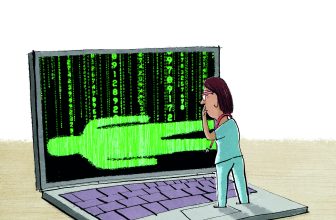
Patients recording consultations: getting the balance of patient choice and privacy right
- Caroline Osborne-White, medicolegal consultant and trainer,
- Medical Protection Society
Over the past 10 years, with advancements in technology facilitating our ability to record easily with our mobile devices, the Medical Protection Society (MPS) has seen a rise in the number of doctors asking where they stand if a patient has recorded their consultation or would like to record future appointments.
In most cases, the recordings are intended for personal use; they act as an aide memoir—perhaps for complex treatment regimens or to help the patient in recalling or understanding a difficult diagnosis when they get home.
The trend peaked during the covid-19 pandemic, when many patients were asked to attend healthcare appointments alone and visitors were restricted from coming into most hospitals. Against this backdrop, recording medical appointments was often beneficial and consensual, enabling family members to be included in decision making.
In recent years, however, more patients are filming their healthcare interactions with a wider audience in mind. The number of patients with a social media presence has increased and there are countless influencers with thousands of followers. This, coupled with the rise of social media platforms that favour video, has contributed to an increase in patients filming themselves undergoing medical procedures and uploading the recording to their TikTok or Instagram accounts. This motivation for capturing medical consultations feels—at least on the surface—less palatable.
This is exactly the trend the Society of Radiographers raised concerns about earlier this month.1 In one case a patient’s daughter began filming the insertion of a cannula into her mother’s hand because she thought it would be “entertaining” on social media.
Other concerns included the fact that permission was not sought to record, that healthcare professionals’ names were captured from their name badges, and, most importantly, that other patients on the ward or nearby were inadvertently caught on camera, with personal conversations and information filmed or captured in audio.
Unsurprisingly, the healthcare professional in the above example lost sleep worrying about whether she should have, or indeed could have, stopped the recording.
So, where does the regulator and Information Commissioner’s Office stand on the issue of recording medical treatments or procedures, and how should healthcare staff sensibly interpret the advice in this more extreme context?
In line with the principles of UK General Data Protection Regulation and the Data Protection Act 2018, although doctors must obtain consent for their own recordings, patients don’t need permission to record their own consultations, as it is considered personal data processing.2 It becomes more complex, however, when a recording of one patient poses a risk to the privacy of another. The General Medical Council places great importance on maintaining patient confidentiality, as outlined in its guidance.3 Confidentiality is both a professional duty and a legal requirement for doctors. It is also fundamental to the trust between patients and doctors.
If a patient finds out that they feature in a video recorded by another patient, which has been shared extensively on social media, or hear their personal information within it, this would be a breach of their confidentiality. It is therefore sensible for healthcare professionals and providers to consider appropriate steps to avoid this and any associated repercussions.
Understanding the patient’s perspective
Healthcare professionals faced with a patient who wants to press record should be ready to discuss this with them. The first step in the conversation should be to try and understand why the patient would like to record their treatment. As previously discussed, they may have personal or medical reasons for wishing to do so. Even if they state that it’s for social media use, they may still have reasonable motivations that are worth considering. A patient with a chronic condition, or who is going through fertility or cancer treatment, for example, may want to be transparent about their journey and document its highs and lows to help other people in a similar position. In this situation the healthcare professional may be able to take steps to mitigate the risks to other patients’ privacy.
If after the conversation, the healthcare professional is uncomfortable with the prospect, they could express their discomfort politely and professionally, advising the patient that they would prefer the procedure isn’t recorded. It would be helpful to explain any concerns about the patient’s own confidentiality if the intention is for the recording to be shared widely and, most importantly, that there is a risk to the confidentiality of other patients at the hospital.
Some healthcare facilities already have policies in place around patients filming procedures. These will likely vary, with some facilities prohibiting recordings altogether, some only in areas or situations where the privacy of others could be at risk, and others stating that consent should be sought first. All healthcare organisations should consider developing such a policy, as this would explain the privacy risks of filming to the wider public and help to ensure that conversations with patients remain non-confrontational.
It is worth noting that a consultation or treatment should not be refused if a patient still wishes to record their procedure, despite the treating healthcare professionals expressing discomfort. The clinician has a duty of care to the patient and could face criticism if they did not treat them as planned and they subsequently came to harm. A consultation or treatment should also not be terminated if a patient is found to be recording it. In this situation, it is advisable to ask for a copy for the patient’s medical record.
Doctors need to strike a balance between the patient’s right to record their own consultations, and the legal and professional obligation for them to protect all patients’ confidentiality. This can be complex, and all healthcare providers should take appropriate steps to ensure staff feel supported in handling any situations that arise.
Footnotes
-
Competing interests: MPS membership provides the right to request access to expert advice and support on clinical negligence claims, complaints, GMC investigations, disciplinaries, inquests, and criminal charges such as gross negligence manslaughter.
-
Provenance and peer review: Commissioned, not externally peer reviewed.



